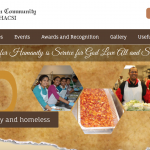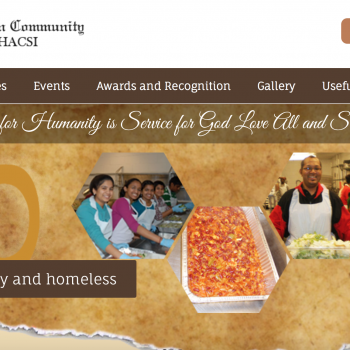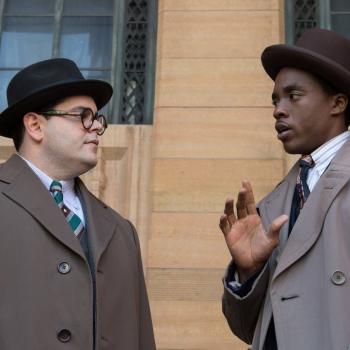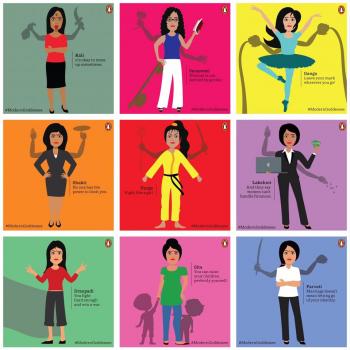Deepavali or Diwali is often called the Festival of Lights; the holiday is rooted in the story of Lord Rama and his return from exile. The rows of diyas lit in celebration of Rama’s return represent light in its most basic form: providing knowledge, dispelling ignorance. This explanation ignores the complexity of its message about transcendence to a higher unitary consciousness which David Frawley has clearly explained. But I was at least able to to do something concrete this week, by participating in the Bhumi Project’s Green Diwali Webinar: honoring the sacredness of our planet, and discussing ways to protect Mother Earth.
As a panelist representing the Hindu American Foundation, I spoke alongside two amazing women, Shyla Raghavan and Keya Chaterjee for an hour and could have gone longer as the Q&A went on. The webinar was moderated by Gopal Patel, the Director of the Oxford, UK-based Bhumi Project, and a GreenFaith partner. I came across Gopal and Bhumi Project years ago when I was seeking a Hindu version of the several organizations pursuing climate change awareness and action based in Christian theology, such as Evangelical Environmental Network and CreationCare.org. Gopal and my fellow panelists have made careers focused on concern about and care of the planet: they serve as an inspiration about how we can put our (Hindu) faith into action.
Keya Chatterjee, the first panelist, is Executive Director of US Climate Action Network and author of the book The Zero Footprint Baby: How to Save the Planet While Raising a Healthy Baby. Keya’s commentary on climate change policy and sustainability issues has been quoted in dozens of media outlets such as USA Today, the New York Times and NBC Nightly News. Her work focuses on building an inclusive movement in support of climate action. She has a wide range of prior experience: Senior Director for Renewable Energy and Footprint Outreach at the World Wildlife Fund (WWF); a Climate Change Specialist at USAID; at NASA; in the Peace Corps. Her approach to protecting Bhumi Devi is a very practical one – she and her husband have reduced their carbon footprint starting with getting rid of their cars (an option not easily available to metro-Detroiters), and only get on an airplane once a year. It was obvious that so much of her passion comes from wanting to save the planet for her young child – the same maternal drive that is the underlying energy for my activism.
The next speaker was Shyla Raghav, who leads Conservation International’s climate strategy to build and support the development and implementation of climate change mitigation and adaptation action globally. With a master’s in environmental management from Yale University, the young woman offers me hope that the next generation of Hindu Americans are pursuing careers to make a difference in this international movement. Shyla and her global team engage with key partners to amplify CI’s successful climate change strategies, to demonstrate that ecosystem-based mitigation and adaptation offer tremendous opportunities for meeting the climate challenge. Having participated for almost a decade in United Nations climate change initiatives, she has worked on multiple projects in the field, addressing water scarcity and food security with organizations such as the Adaptation Fund, the Caribbean Community Climate Change Center, the UNFCCC, and the UNDP country office in Bangkok. Her work has been instrumental in developing tools to help developing countries adapt to climate change by integrating ecosystems into their climate policies.
Shyla’s locally-focused efforts resonated with my own local and regional efforts to develop inter-cultural and -religious understanding and cooperation. I spoke about how I came to advocacy at the Hindu American Foundation, a national organization that promotes mutual understanding and pluralism, focusing on the three pillars, of education, policy and community engagement. Being excluded from a city-sponsored National Day of Prayer event in 2005 spawned my activism into new arenas – including my current efforts to evangelize not only on religious freedom and inclusion, but also on vegetarianism – a really simple way to reduce one’s carbon footprint and impact climate change at a personal level. I highlighted HAF’s participation in the 2015 Climate Conference and contribution to the Hindu Declaration on Climate Change, grassroots efforts at local chapters around the country, and our partnership with the Bhumi Project to support the Bhumi Pledge on college campuses.
I was able to point out how human rights and climate change are inextricably connected, with major studies providing sobering evidence that a hotter, increasingly unstable climate is fueling more conflict and human rights violations. Prof. Solomon Hsiang from the University of California, Berkeley and other researchers echo what I see in my own backyard. It is vulnerable populations that lose the most when we don’t protect our environment, be it in Detroit or around the world. In highlighting this, I found myself transcending to a higher consciousness, recognizing our oneness and the one planet we all must protect.















